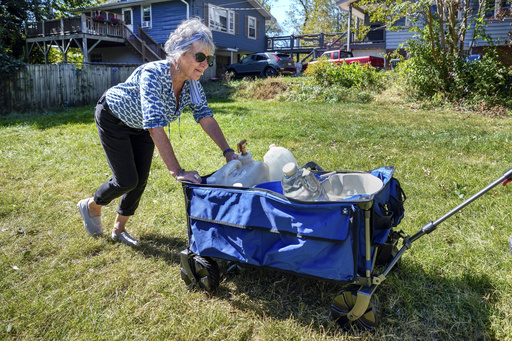
ASHEVILLE, N.C. — The aftermath of Hurricane Helene has left many North Carolinians in dire straits, particularly concerning their access to clean water for sanitation purposes. Three weeks after the storm ravaged the region, locals like Lark Frazier have seen their neighbors struggle to cope with the lack of water needed to flush toilets. During her outreach efforts, Frazier witnessed firsthand the emotional toll this crisis has taken, with several residents bursting into tears at the mention of their sanitation struggles.
Some community members have resorted to limiting their food intake in hopes of avoiding bathroom needs, while others have taken to unsanitary practices such as disposing of waste outside, camouflaging it with leaves. An elderly resident even shared plans to manually remove waste from her toilet—a situation that Frazier describes as both horrifying and dangerous.
As the storm devastated mountain towns, disrupted water systems, and claimed nearly 250 lives across the region, local authorities have struggled to effectively address these challenges, prompting a wave of grassroots community organizing. Frazier, drawing from her rural Colorado upbringing that involved using an outhouse, has stepped up as a new leader in this effort. She discovered an Emergency Toilet Guidebook online and began creating makeshift toilets for those in need, while also teaching her neighbors how to make their own emergency sanitation solutions.
The process Frazier employs is straightforward: a sturdy bucket is lined with a thick plastic bag and topped with a comfortable seat, with wood chips added after each use to absorb liquid and minimize odors. It’s crucial to keep urine separate from waste material. According to Sue Mohnkern, the creator of the guidebook, improper waste management can lead to severe public health issues, including epidemic diseases such as cholera and dysentery.
Despite the pressing need for waste management guidelines from local government, neither the city nor county has released formal protocols, which Frazier has called “astounding.” A county representative noted that the overwhelming scale of the disaster has made it difficult to address every crucial concern. In response, city council members, like Kim Roney, have been proactive in spreading the word about emergency toilet usage through social media and informational videos.
In the wake of the disaster, the local government established water refill stations about a week after Hurricane Helene made landfall. According to the Environmental Protection Agency, at one point, there were around 136,000 residents without access to functioning water services, a figure that included about 100,000 people in the Asheville area. Although that number has since decreased, thousands still report having no water, and uncertainty looms as to when normalcy will return. For those unable to reach refill sites, volunteers are stepping in to fill the gaps.
Molly Black and Elle DeBruhl, two individuals who met through this crisis, are now on a mission to ensure that their neighbors have access to flushing water. Donations of large 250-gallon plastic containers, known as IBC totes, have been pouring in from across the country. Black and DeBruhl have coordinated efforts to transport these containers to nearby ponds, filling them with water and delivering them to high-need areas such as apartment complexes. With text messages now functioning again, residents can contact their grassroots group, dubbed Flush AVL, to request water refills for their containers. The group manages to restock about 400 locations every other day, with support from the city to some extent, but the bulk of the work relies on volunteers.
The community is coming together in remarkable ways, with Erik Iverson setting up a system to provide purer water from a well owned by a nearby urban farm. With careful planning, he laid plastic piping to allow the well water access from the roadside and installed ultraviolet purification units to create drinkable water alongside the flushing water. In this way, the community has developed touch-free access points to reduce the risk of transmitting germs amid the crisis.
Moreover, the nonprofit organization Wine to Water has funded purification efforts at this well and nine others, expanding access to clean water for the community. Iverson expressed that such initiatives exemplify resilience, noting the importance of having infrastructure in place for communities facing these natural disasters.
In addition to these efforts, a new grassroots organization named Be Well AVL has surfaced in recent weeks to harness high-capacity commercial wells from local establishments and distribute water to low-income and vulnerable residents—an essential resource amid ongoing advisories to boil water. Grace Barron, an organizer with Be Well AVL, emphasizes the need for clean flushing water while also addressing other sanitation concerns, like washing dishes and bathing for infants, underlining the increased importance of community connection during these tough times.
As Asheville navigates the aftermath of Hurricane Helene, the disaster has ignited a potent spirit of mutual aid and solidarity among residents. Barron reflects on the strength of community ties that have emerged, stating that the support networks were present even before the storm, and have only grown stronger.
